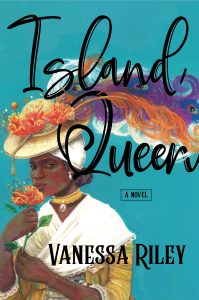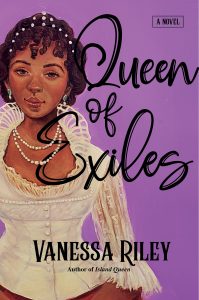Talking About Women’s History: A Whole Bunch of Questions with Vanessa Riley
Honored as the 2023 Georgia Literary Fiction Author of the Year, Vanessa Riley is an acclaimed author known for captivating novels like Island Queen, which is based on the true story of Dorothy Kirwan Thomas, who rose from slavery to become one of the wealthiest and most powerful landowners in the colonial West Indies, and Queen of Exiles, which tells the story of Marie-Louise Christophe, Haiti’s first and only queen.. Riley’s works spotlight hidden narratives of Black women and women of color, emphasizing strong sisterhoods, diverse communities, and power across historical fiction, romance, and mystery genres. With a doctorate in mechanical engineering from Stanford University, Vanessa brings a research-oriented approach to highlight inclusivity in her storytelling about Caribbean, Georgian, and Regency eras, resulting in over twenty-five published titles. As a member of various literary organizations, she advocates for diverse voices and storytelling.
Take it away, Vanessa!
You have written several historical novels based on the lives of real-life Caribbean women during the Georgian period. What path led you to their stories?
The path to discovering the stories of real-life Caribbean women during the Georgian period is part of my heritage. I was told as a child in smaller tales of these exploits. As an adult who loves history, I think I am more attuned to finding these treasures. My passion is to rediscover real Black women and women of color who have impacted history. Their stories are often hidden or purposefully obscured. My desire is to shed light on hidden histories and showcase the resilience and strength of women who’ve been overlooked in traditional historical narratives, our written history books, our conscientiousness.
You have written books based on real historical figures and others that place a fictional woman in a historical setting. How does your writing process differ when you are writing about a real person as opposed to a completely fictional character?
When writing about real historical figures, my process involves extensive research to ensure accuracy while delving into the emotions and motivations. I try to understand the global politics of their situation, as none of history exists in a vacuum. For fictional characters in historical settings, I have more creative freedom to craft their journeys while staying true to the historical context. These fictional characters often represent themes that support the narrative or explain what is happening in the world.
How do you walk the line between historical fact and fiction in a novel?
Balancing historical fact and fiction requires meticulous attention to detail, especially as this may be a reader’s first introduction to this history. I want to provide as many details as possible, including the art of the time period, to immerse readers. If I send you Googling to learn more, I’ve done my job.
What types of sources do you rely on to create rich fictional characters who are historically accurate?
To create rich, historically accurate characters, I rely on a variety of sources such as primary documents, historical accounts, and scholarly research. The art of the time period is also important as it adds depth and authenticity to the storytelling.
You include detailed author’s notes in your novels that provide historical documentation for the stories you tell. What inspired you to include those notes?
Including detailed author’s notes is inspired by my commitment to transparency and providing readers with behind-the-scenes insights into the historical context of my novels. Readers love these glimpses into how the stories come together.
What do you find most challenging or most exciting about researching historical women?
Researching historical women is both challenging and essential due to misogyny, the infantilization of women’s roles, and the intersection of feminism and racism. Many would rather believe that Black women and women of color are limited to enslavement, that they played no part in women seeking the right to vote, etc. It’s crucial to amplify marginalized voices and reclaim their rightful place in history.
What was the most surprising thing you’ve found doing historical research for your work?
One surprising discovery during historical research was the depth of resilience, strength, and elegance in the history of these powerful women. We need these stories to strengthen and inspire women everywhere, showing that obstacles can be overcome with grace and determination.
Are there special challenges to researching women of color, who in some ways have been doubly erased from history?
Researching women of color presents unique challenges due to historical erasure and lack of documentation. However, nothing is more rewarding than restoring these women for modern readers to know and become familiar with.
What work of women’s history have you read lately that you loved? (Or for that matter, what work of women’s history have you loved in any format? )
I’m currently enjoying works like The Four Winds by Kristin Hannah and The Other Princess by Denny S. Bryce, which explore women’s experiences in different historical contexts.
Do you think Women’s History Month is important and why?
Women’s History Month is important as it honors those who came before us, paving the way and holding lanterns to show us how to be resilient and succeed. It’s a time to reflect on the contributions of women throughout history and celebrate their achievements.
Interesting in learning more about Vanessa Riley and her novels?
Check out her website: www.VanessaRiley.com
Follow her Facebook page: Vanessa Riley Author
Follow her on Instagram: vanessarileyauthor
Follow her on the site previously known as Twitter: @VanessaRiley
***
Come back tomorrow for three questions and an answer with Rowena Kennedy-Epstein Author of Unfinished Spirit: Muriel Rukeyser’s Twentieth Century







